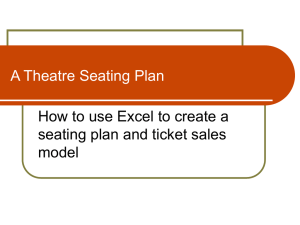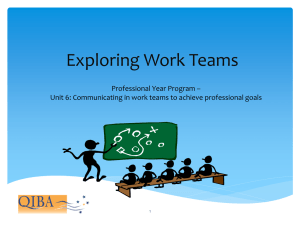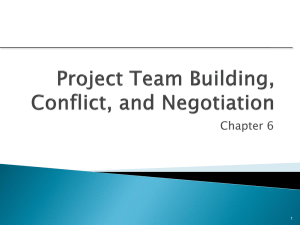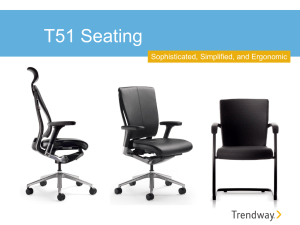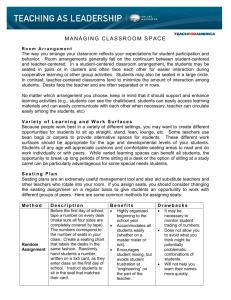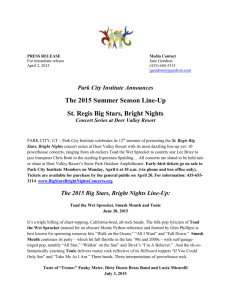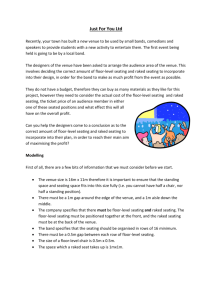The Impact of Arranged Seating and Team Building Activities on
advertisement
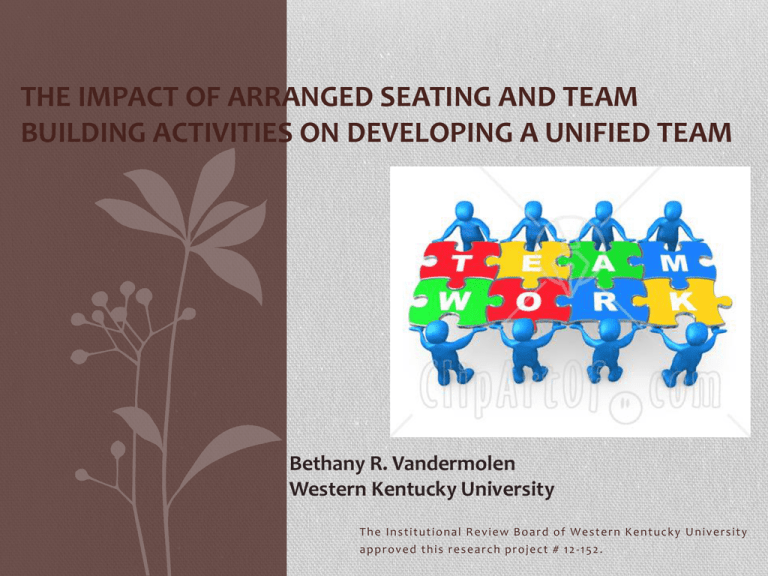
THE IMPACT OF ARRANGED SEATING AND TEAM BUILDING ACTIVITIES ON DEVELOPING A UNIFIED TEAM Bethany R. Vandermolen Western Kentucky University The Institutional Review Board of Western Kentucky University approved this research project # 12 -152. Introduction According to Schwartz (2011), the psychological well-being of employees positively influences job performance. An individual’s affect and their job performance includes: •social relationships •situational sources •and dispositional sources within the workplace (Heaphy & Dutton, 2008; Schwartz, 2011) This review summarizes: •Some potential barriers •How to overcome barriers •Ways to improve staff morale & teamwork When turn over occurs with personnel, new staff members need opportunities to speak and be heard without being ridiculed for efforts or being brushed aside (Meintel, 2005). What can happen when… Baby Boomer Generation Y (or millennials) Generation X http://youtu.be/IEQ1bEaxJe0 combine within the workforce? Potential problems Gaps in ages can often be a cause for communication problems and staff are not always aware of how to communicate. Staff may need to learn how to communicate with each other. Potential problems Hartman and McCambridge (2011) described millennials as needing to feel engaged, participating in the learning process, enjoying the process, and being social learners who tend to work best in team environments. What are some ways to learn to work together? Day-to-day strategies • Improve morale • Change the perspective of the people • Practice some positive workplace practices • Managers to show compassion & empathy • Set positive tone for the beginning of the day Life balance is critical for teams, for them to have fun together both inside and outside of the work place (Jefferson, 2010). What are some ways to learn to work together? Team building activities Team Building Keys to successful team building activities: • every individual’s contribution • activities planned and selected with care • activities be serious business • activities to involve a set of strategies firmly rooted in workplace dynamics (Laff, 2006; Sturdivant, 2008; Miller, 2007) The first step includes…. figuring out the goal(s) you are trying to achieve from the use of team building activities. Activities may include: • how to communicate better • manage conflict • understand skills and talents that everyone brings to the table (Woodward, 2006) Two key factors for effective team building activities the discussion and analysis seeing teamwork becoming integrated into day-to-day work (Laff, 2006; Woodward, 2006) Planning for team building activities should also require thought about seating arrangements such as circular or rectangular arrangements, where all participants can see each other work best (Brotherton, 2010) Current study Evaluated the impact of the implementation of a team building activity and arranged seating on personnel teamwork and morale within LifeSkills Incorporation, the Developmental Services Department/First Steps staff. Who & What First Steps is a state-wide program. The local district is called Barren River with the Point of Entry office housed within LifeSkills Incorporation’s Developmental Services Department (Bowling Green, KY). History of the personnel 2007 – 5 personnel •4 full time employees, 1 part time 2012 – 11 personnel •10 full time, 1 part-time Out of the 11, seven personnel have been employed for over a year. Four personnel have been employed under a year. Triangulation of Data Data was collected: •To gauge current level of staff morale •To gauge current level of group teamwork To determine how effective the addition of team building activities….. and to determine if arrangement of seating arrangement affected staff morale and teamwork. Data type one One-on-one interviews •between each professional and the principal investigator •used five open ended questions Data type two During the implementation, a reflective journal was kept. •by the principal investigator Data type three Upon completion of the implemented activities a survey was completed. •had eight initial questions based on a Likert scale •two conclusion questions •completed by participating professionals The Implementation Over three weeks, the weekly staff meeting: •included one team building activity •had arranged seating Common thoughts about staff morale: Positive statements from the interviews: Recommendations made: Reflective Journal There were incidents during the weeks when a professional arrived to the meeting late and/or had to leave early. • Other than people entering and exiting during meetings no disruptions was noted during staff meetings. Use of cell phones was observed during meetings. • No specific disruptions were observed by the use of them. • A variety of all the professionals was recorded regarding questions being asked and/or being active in discussions. Survey Results 6 5 4 Strongly Disagree Post-SD Disagree Post-Disagree 3 Agree Post-Agree Strongly Agree 2 Post-SA 1 0 Pay sufficent attention Self Distracted Distracted by others Seating impacts Survey final questions Team building activities: Survey last two questions Research Limitations •use of a small number of professionals •professionals not being truly open or honest in their answers within the interviews or the surveys •this research may not be able to be applied to different fields or workplaces. Impacts •Decision for continuing team building activities on a monthly basis. •The effect of the arranged seating was extremely hard to determine and was found to have little to no influence with the group. •The reflective journals also gave no indication that the different seating arrangements resulted in the professionals engaging more or less as their engagement. Impacts The team was be able to identify common concerns and strengthens. •It also impacted planning for the future to include continued team building activities. References Brotherton, P. (2010, November). Seating arrangements can affect group morale. T+D, 64(11), 24. Department for Public Health. (2012). 902 KAR 30:150. Personnel qualifications. Retrieved from http://www.lrc.ky.gov/kar/902/030/150.htm. Hartman, J. L., & McCambridge, J. (2011). Optimizing Millennials’ communication styles. Business Communication Quarterly, 74(1), 22-44. Heaphy, E. D., & Dutton, J. E. (2008). Positive social interactions and the human body at work: Linking organizations and physiology. Academy of Management Review, 33(1), 137-162. Hrmixbag (2010). Retrieved from http://www.youtube.com/watch?v=IEQ1bEaxJe0&feature=youtu.be Jamail, N. (2011). How to improve your team’s morale. Supervision, 72(9), 13-14. Jefferson, A. I. (2010, November). Let’s go team. Black Enterprise, 41(4), 48. Laff, M. (2006, August). Effective team building: more than just fun at work. T+D, 60(8), 24. Meintel, J. (2005, July/August). Building a team. Mobility Forum: The Journal of the Air Mobility Command’s Magazine, 14(4), 32-34. Michelini, R. L., Passalacqua, R., & Cusimano, J. (2001). Effects of seating arrangement on group participation. The Journal of Social Psychology, 1976 (99), 179-186. Miller, B. C. (2007). Quick activities to improve your team: How to run a successful team-building activity. Journal for Quality & Participation, 30(3), 28-32. Moore, P. (2007, April). Team talk. NZ Marketing Magazine, 26(3), 38-40. Priebe, S., Fakhoury, W. H., Hoffman, K., & Powell, R. A. (2005). Morale and job perception of community mental health professionals in Berlin and London. Social Psychiatry & Psychiatric Epidemiology, 40(3), 223-232. Ryan, K. (2012, January/February). Gilt Groupe’s CEO on building a team of a players. Harvard Business Review, 90(1/2), 43-46. Schwartz, A. (2011). Foster care workers’ emotional responses to their work. Journal of Sociology & Social Welfare, 28(3), 31-51. Sturdivant, J. (2008, April/May). Make the team. Wearables Business, 12(4), 25. Woodward, N. (2006, September). Make the most of team building. Hrmagazine, 52(9), 72.


